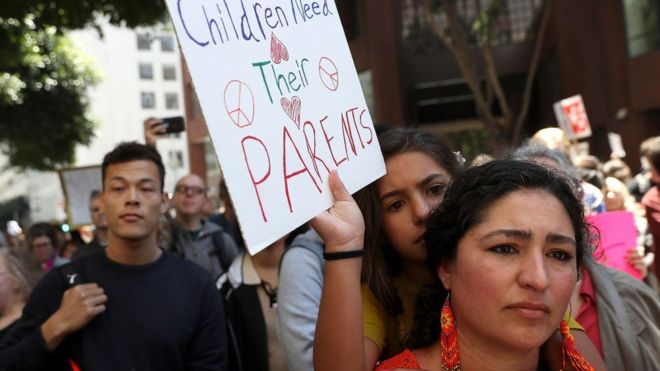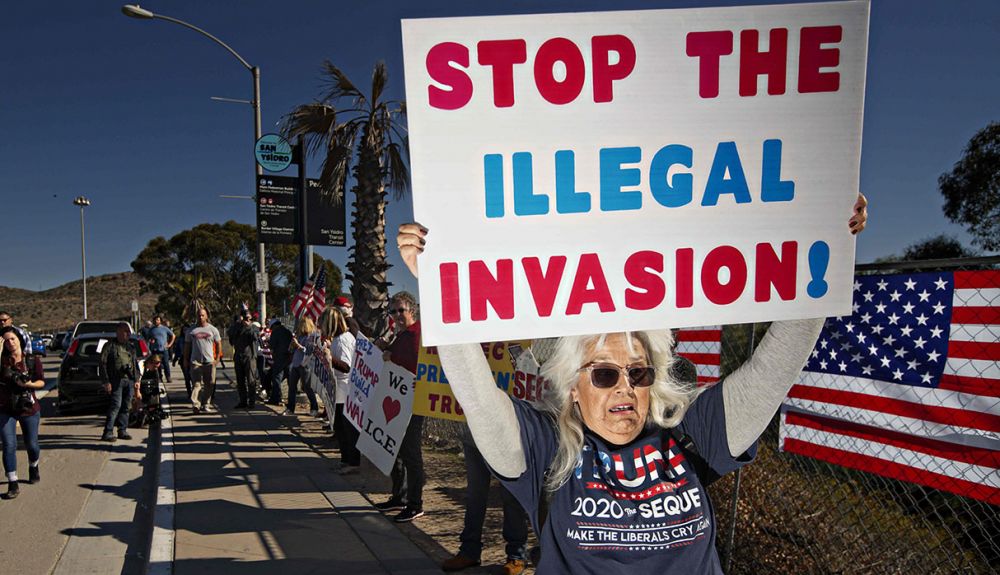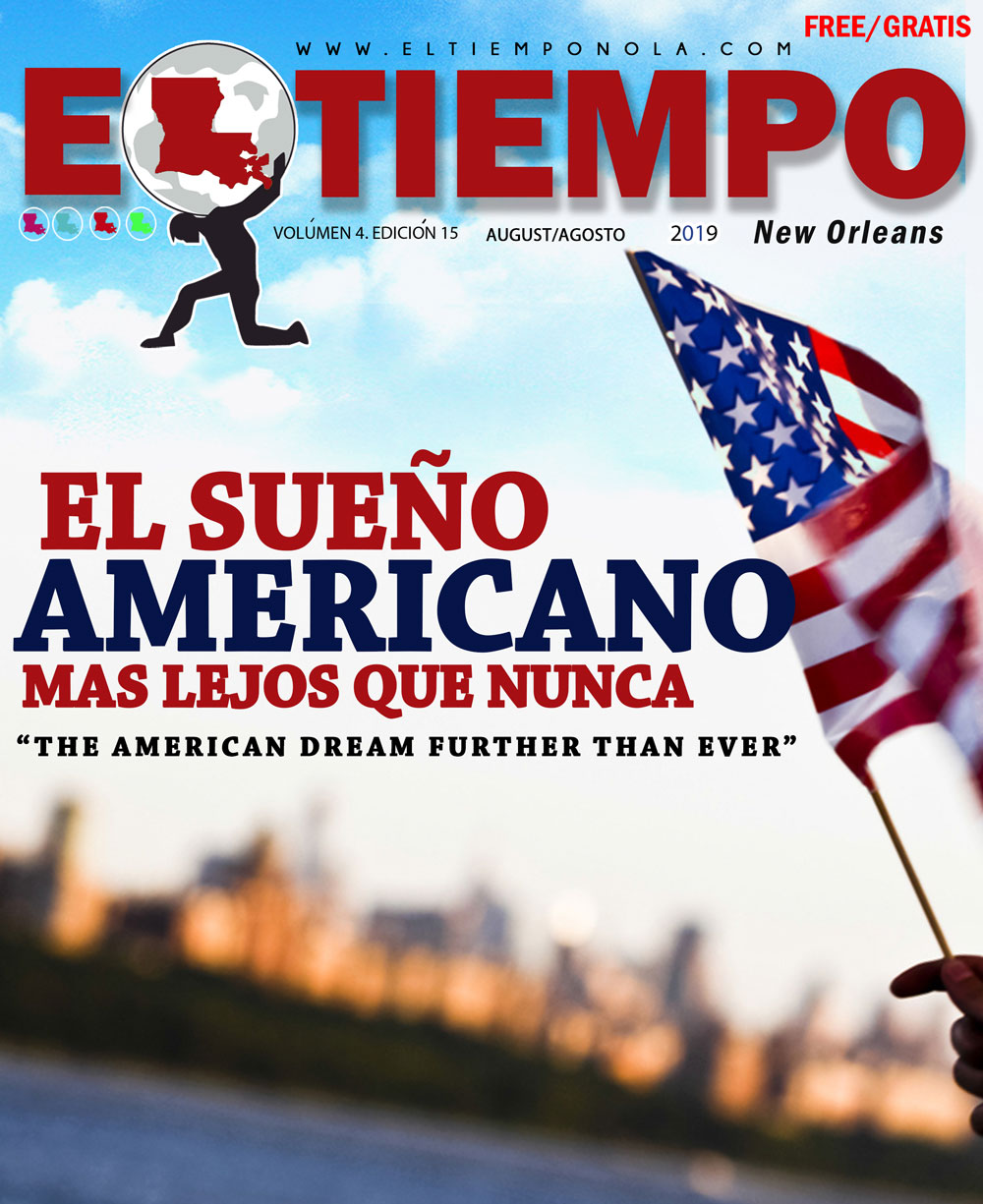El Servicio de Ciudadanía e Inmigración de Estados Unidos (USCIS, por sus siglas en inglés) publicó una nueva norma en la que establece que aquellos inmigrantes legales que puedan convertirse en una «carga pública» no podrán obtener una visa, ni la residencia permanente (conocida como greencard) ni la ciudadanía estadounidense.
La regulación se basa en la idea de que los extranjeros que quieran residir en Estados Unidos deben ser capaces de mantenerse por sí mismos y que las ayudas del Estado deben reservarse a los nacionales del país.
◾Cómo el gobierno de Trump está limitando también la inmigración legal a Estados Unidos
◾“Los inmigrantes están infestando este país”: la defensa de Trump de su política de separar a los niños de sus padres indocumentados
La medida afectará a quienes reciban ayudas públicas como los cupones para alimentos (conocidos como food stamps) o los subsidios para el pago de alquiler, otorgados a personas que viven por debajo del umbral de pobreza.
La norma también cerrará las puertas de EE.UU. a quienes hayan recibido atención sanitaria a través del Medicare, entre otros programas públicos.
Saltar las recomendaciones
Quizás también te interese
«No estamos en situación de matarnos unos a otros»: entrevista exclusiva de BBC Mundo al presidente de Haití Jovenel Moïse en plena crisis del país caribeño
El escándalo del chat del gobernador de Puerto Rico que provocó una crisis institucional en la isla
5 gráficos que explican el estado actual de la inmigración ilegal en Estados Unidos
Qué impacto tiene el «significativo» aumento de los salarios en Cuba, la nueva medida del gobierno contra la crisis y la escasez
Fin de las recomendaciones.
Hablas inglés y tienes dinero?
La nueva regulación publicada por el USCIS entrará en vigor el próximo 15 de octubre, aunque expertos en política migratoria advirtieron que la alta probabilidad de que la medida fuera impugnada ante los tribunales, lo que puede retrasar o impedir su puesta en marcha.
Una acción de este tipo fue anunciada ya este lunes por la fiscal general de Nueva York, Letitia James.
«La nueva regla de carga pública del presidente Trump es un ejemplo más de cómo este gobierno le da la espalda a la gente que pelea para lograr una vida mejor para ellos y para sus familias», dijo James en una declaración.
«Bajo esta norma, los niños pasarán hambre, las familias se quedarán sin atención sanitaria», agregó.
Entre los aspectos cuestionados de la nueva regulación se apunta al hecho de que los funcionarios de migración podrán denegar la residencia permanente o la ciudadanía a aquellas personas que considera que tienen probabilidad de necesitar ayudas públicas en algún momento en el futuro.
Entre los factores que las autoridades tomarán en consideración se incluyen:
◾Si el inmigrante ha recibido o, incluso, si ha obtenido aprobación para obtener ayudas públicas (aunque no las haya utilizado).
◾Si la persona ha pedido que le exoneren del pago de las tasas para los trámites migratorios, pues esto demostraría que su situación financiera no es sólida.
◾El historial crediticio. En Estados Unidos cada ciudadano recibe un puntaje de crédito según su solvencia y el gobierno espera que los inmigrantes tengan una puntuación similar o superior al del estadounidense promedio.
◾La disponibilidad de recursos económicos. USCIS evaluará si el inmigrante parece estar en capacidad de hacer frente a una emergencia médica en el futuro, para lo cual tomará en cuenta si dispone de un seguro médico privado.
◾La educación y las habilidades profesionales. El gobierno de EE.UU. evaluará si la persona cuenta con una formación que le permita obtener y mantener un empleo. El conocimiento del inglés es uno de los elementos a considerar en este punto.
Con esta nueva regulación, los inmigrantes que no cumplan con estos requisitos o que tengan probabilidad de depender de ayudas públicas como el seguro de salud público Medicare en el futuro podrán verse impedidos de entrar en Estados Unidos.
En el caso de aquellos que ya se encuentran en territorio estadounidense, no podrán obtener la residencia permanente o adquirir la ciudadanía.
A favor de los ricos?
Marielena Hincapie, directora ejecutiva del National Immigration Law Center, una ONG con sede en Los Ángeles, cuestionó la nueva regulación y señaló al diario The Washington Post que se trata de «fundamentalmente de un intento del presidente Trump de transformar nuestro sistema migratorio en favor de los ricos».
En un encuentro con la prensa para explicar el alcance de la norma propuesta, el director encargado del USCIS, Ken Cuccinelli, restó importancia a la misma y la presentó como un ajuste a una regla que ya existía.
«Esta es una norma que tiene 140 años. Estamos frente a su ajuste más reciente pero esto no es nuevo», dijo.
«Simplemente estamos haciendo efectivo lo que ya el Congreso había puesto en la ley. Así que no hay razones para que ningún grupo en particular sienta que esto está dirigido en su contra», agregó al ser preguntado sobre si se trataba de una regulación en contra de la inmigración latina.
Sin embargo, la ONG Florida Inmigrant Coalition, denunció que la nueva regla significa una ruptura radical de políticas anteriores referidas a los inmigrantes que buscan la residencia permanente.
«Esto impactará dramáticamente las vidas de los inmigrantes, especialmente de las personas pobres de color. Se trata de familias que trabajan duro buscando desarrollar todo su potencial mientras contribuyen grandemente a la cultura y a la economía estadounidense», dijo Isabel Vinent, directora ejecutiva de esa organización.
La nueva norma para evitar que los inmigrantes se conviertan en una «carga pública» es el cambio más reciente impulsado por la Casa Blanca para intentar frenar el ingreso a Estados Unidos de inmigrantes tanto legales como ilegales.
Iniciativas anteriores han buscado vetar la entrada de personas procedentes de varios países de mayoría musulmana, revocar el programa DACA (que beneficia a los inmigrantes que llegaron ilegalmente a EE.UU. siendo menores de edad) así como poner fin a los programas de protección temporal a inmigrantes de El Salvador, Honduras, Haití o Nicaragua.

Hasta ahora, todos estos cambios han sido llevados ante los tribunales, donde ha sido suspendida la aplicación de la mayor parte de ellos.
The United States Citizenship and Immigration Service (USCIS) published a new rule that states that legal immigrants who can become a «public charge» cannot obtain a visa or permanent residence ( known as greencard) or U.S. citizenship.
The regulation is based on the idea that foreigners who want to reside in the United States must be able to support themselves and that state aid must be reserved for nationals of the country.
◾How the Trump administration is also limiting legal immigration to the United States
◾ “Immigrants are infesting this country”: Trump’s defense of his policy of separating children from their undocumented parents
The measure will affect those who receive public assistance such as food stamps (known as food stamps) or rent subsidies, granted to people living below the poverty line.
The standard will also close the US doors. to those who have received health care through Medicare, among other public programs.
Skip the recommendations

You may also be interested
«We are not in a position to kill each other»: BBC Mundo’s exclusive interview with Haitian President Jovenel Moïse in the midst of the Caribbean country crisis
The chat scandal of the governor of Puerto Rico that caused an institutional crisis on the island
5 graphs that explain the current state of illegal immigration in the United States
What impact does the «significant» increase in wages in Cuba, the new government measure against the crisis and scarcity have
End of recommendations.
Do you speak English and have money?
The new regulation published by the USCIS will enter into force on October 15, although experts in immigration policy warned that the high probability that the measure would be challenged before the courts, which may delay or impede its implementation.
An action of this type was announced on Monday by the New York attorney general, Letitia James.
«President Trump’s new public charge rule is another example of how this government turns its back on people who fight for a better life for themselves and their families,» James said in a statement.
«Under this rule, children will go hungry, families will run out of health care,» he added.
Among the questioned aspects of the new regulation is the fact that immigration officials may deny permanent residence or citizenship to those who believe they are likely to need public assistance at some time in the future.
Among the factors that the authorities will consider include:
◾ If the immigrant has received or even if he has obtained approval to obtain public assistance (even if he has not used them).
◾If the person has asked to be exempted from paying the fees for immigration procedures, this would show that their financial situation is not strong.
◾ Credit history. In the United States each citizen receives a credit score according to their solvency and the government expects immigrants to have a score similar to or higher than the average American.
◾ The availability of economic resources. USCIS will assess whether the immigrant appears to be able to cope with a medical emergency in the future, for which he will take into account if he has private medical insurance.
◾Education and professional skills. US government assess whether the person has a training that allows them to obtain and maintain a job. Knowledge of English is one of the elements to consider at this point.
With this new regulation, immigrants who do not meet these requirements or who are likely to depend on public aid such as Medicare public health insurance in the future may be prevented from entering the United States.
In the case of those already in the United States, they will not be able to obtain permanent residence or acquire citizenship.
In favor of the rich?
Marielena Hincapie, executive director of the National Immigration Law Center, an NGO based in Los Angeles, questioned the new regulation and told The Washington Post that it is «fundamentally an attempt by President Trump to transform our immigration system in favor of the rich».
In a meeting with the press to explain the scope of the proposed rule, the director in charge of the USCIS, Ken Cuccinelli, downplayed it and presented it as an adjustment to a rule that already existed.
«This is a standard that is 140 years old. We are facing its most recent adjustment but this is not new,» he said.
«We are simply making effective what Congress had already put in the law. So there is no reason for any particular group to feel that this is directed against them,» he added when asked about whether it was a regulation against of Latin immigration.
However, the Florida Immigrant Coalition NGO denounced that the new rule means a radical rupture of previous policies regarding immigrants seeking permanent residence.
«This will dramatically impact the lives of immigrants, especially poor people of color. These are hard-working families seeking to realize their full potential while contributing greatly to American culture and economy,» said Isabel Vinent, executive director of that organization.
The new norm to prevent immigrants from becoming a «public charge» is the most recent change promoted by the White House to try to stop the entry of both legal and illegal immigrants into the United States.
Previous initiatives have sought to veto the entry of people from several Muslim-majority countries, revoke the DACA program (which benefits immigrants who arrived illegally in the US as minors) and terminate temporary protection programs to immigrants from El Salvador, Honduras, Haiti or Nicaragua.
So far, all these changes have been brought before the courts, where the application of most of them has been suspended.

